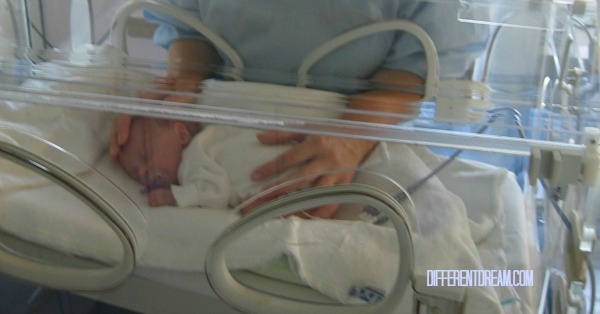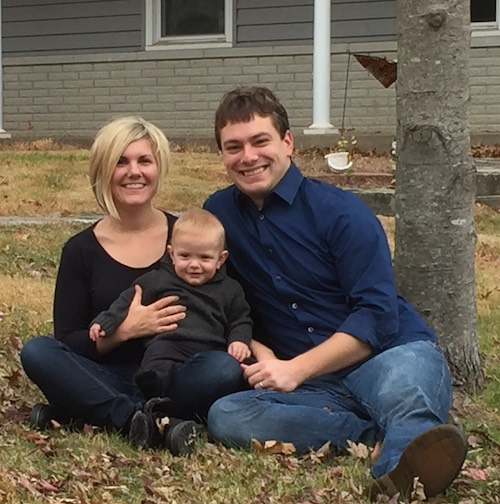So You’re a NICU Parent

EA/TEF Awareness Month is moving full steam ahead at Different Dream throughout January. This week’s post comes from guest blogger and EA/TEF and NICU parent Brianna Lennon. Ryan, her baby boy, turned 1 in December of 2015, so her observations about how to advocate for your NICU baby are fresh and field tested. Here’s what she learned during her little boy’s hospital stay.
So You’re a NICU Parent
When you first saw those two little lines on the pregnancy test, you probably didn’t imagine a premature and heavily medicated birth coupled with a long hospital stay and several surgeries. For new parents-to-be, the Neonatal Intensive Care Unit is never in the birth plan.
Our story began at the 20-week ultrasound when our regular obstetrician was unable to see our baby boy’s stomach. For the next two months, we had follow-up scans with an MFM that finally broached the potential of esophageal atresia. We delved into research–on hospitals, surgeons, EA, insurance–came up with plans for each scenario we might face since we couldn’t diagnose the severity of his EA.
We hoped and prayed that I’d make it to 34 weeks. At 34 weeks and 1 day, Christmas Day, we welcomed our 4 pound, 5 ounce baby boy into the world. Our research paid off in terms of understanding Ryan’s EA, but we were still totally unprepared for the NICU stay. Throughout the five months we spent at two different hospitals, I reflected on what we wished we’d known and what we could tell other parents. As a first-time parent who’s way too familiar with the NICU, I hope these tips provide some guidance to the uninitiated.
First, NICU Parent, Be a Big, Brave Dog
I remember encountering the Very Confident Doctors and Very Confident Surgeons in NICU. I had no self-confidence at all and passively accepted what was happening. A few days in, I realized that all the research I’d done and all the knowledge I’d gained wasn’t doing my son any good if I didn’t show my confidence. We started questioning more, engaging more, and asserting our decisions. We learned that sometimes the doctors don’t mention when they’ve changed your child’s plan and that you should definitely call them on that. We had to be extra-confident when our surgeon removed Ryan’s replogle tube without asking when we wanted it replaced. Finally, we learned that we had to have confidence that we knew our son the best and were ultimately responsible for his care. It’s very easy in a NICU environment to feel helpless, confused, and lost. The good news is that once you assert yourself the first time, the second, third, and tenth times get that much easier.
Second, a NICU Parent Must Become an Encyclopedia
A lot of medical jargon and surgical decisions arise in the course of treatment of an EA baby. Only four basic ways exist to fix an esophageal gap, but there are countless complications, variations, and related defects to consider. Familiarize yourself with them. Find medical journals, blog posts, support groups, and Facebook pages to solicit as much information at possible. Ask questions of your doctors. I prepared lists of questions to ask the surgeons before and after Ryan’s birth. Feel free to email me if you want them. The more information you have, the better. But be prepared to find some gaps in it.
One caveat, though. There were times during pregnancy when I became obsessed with research and suffered from information overload. That’s when you need a sounding board–another parent, a spouse, a sibling–to bring you back from the edge.
Third, a NICU Parent Must Find the Helpers
Fred Rogers used to say that when he saw disasters on the news as a child, his mother told him to “look for the helpers. You will always find people who are helping.” In my hospital experience, the helpers were the nurses, the chaplains, and the lactation consultants. We had our core group of nurses that we counted on everyday for support, extraordinary care for our son, and levity. I found that the physical and emotional capability of NICU nurses was virtually endless. Find the ones who can get you through the day and get them on your child’s rotation as much as possible. We had a crazy-good tag team of nurses that figured out a novel way of g-tube feeding Ryan when he wasn’t gaining weight. One nurse could be trusted to keep the tape on Ryan’s replogle every night. Seek out the on-staff social worker or chaplain when you’re experiencing overwhelming stress. These are the helpers.
Finally, NICU Parent, It’s All about Perspective
I count my husband and myself lucky. Sure, we cried hours a day every day for the first few months. Sometimes it still seems like only yesterday we ended a 100-plus-day stint in two different NICUs across 4 holidays 1,000 miles from home. But, as Cormac McCarthy so eloquently penned, “you never know what worse luck your bad luck has saved you from.”
With that mindset I knew we were lucky every day we walked into the NICU and continued our ritual of learning to be parents while navigating the emotional landmines of the NICU. Lucky because we had each other to lean on, lucky because we truly believed our son would come through with flying colors, and lucky because he was diagnosed with only one out of hundreds of possible birth defects.
For the uninitiated, lucky is probably the last word that comes to mind, but I think it’s important that people recognize it can play a part in a long hospital stay. NICU parents come in all shapes and sizes. They’re there for different reasons, they’re facing different struggles, and their children’s outcomes may be different. It’s an overwhelming, all-consuming and emotionally raw time. Thoughts and prayers go a long way in grappling with stress, but it’s equally important for parents to find those little lucky parts of the day, if only to hang onto their sanity. Sure, my son was septic after a central line infection. I knew what that meant and I knew it wasn’t good, but how lucky that it was a treatable infection. How lucky that after two weeks of IV drugs, he was no worse for wear. And how lucky that the need to treat that infection sped up the timeline for the swallow study and his first bottle.
Perspective is everything in the NICU. You don’t need to feel lucky or blessed or thankful every day, but seek out the times when you do. Cling to those moments and remember that you don’t know what you were spared. No parent chooses to raise a child in the NICU. It’s a crap deal and there’s no getting around it. But it’s also a time of growth and of amazing resilience. NICU parents and their babies wear badges of strength and humility. It’s an experience I wouldn’t trade for anything.
Are You a NICU Parent? What Do You Have to Say?
Are you the parent of a child who spent time in NICU as a newborn? What advice do you have to add to Brianna’s? Leave a comment.
Do you like what you see at DifferentDream.com? You can receive more great content by subscribing to the quarterly Different Dream newsletter and signing up for the daily RSS feed delivered to your email inbox. You can sign up for the first in the pop up box and the second at the bottom of this pa

By Brianna Lennon
Brianna Lennon is an attorney, political junkie, wife, and Ryan’s mom. She spends her time working in public service and trying to survive life with a toddler that was born with esophageal atresisa. Brianna lives in Missouri with her husband, son, and two dogs.
Subscribe for Updates from Jolene
Related Posts
Did I Trust God’s Plan for the Life of My Child with Disabilities?
Jolene looks back on the lessons she’s learned and ponders, “Did I trust God’s plan for the life of my child with disabilities?”
Two Coping Skills for Families with Disabilities
Guest blogger Kristin Faith Evans explains two coping skills for families with disabilities that have helped her over the years.
Special Needs Homeschooling: The Ups and Downs
Special needs homeschooling is full of ups…and downs. Guest blogger Lisa Pelissier knows this from experience. In this post she describes her adventures in homeschooling, which began long before she discovered she had joined the special needs homeschooling tribe. I...






0 Comments